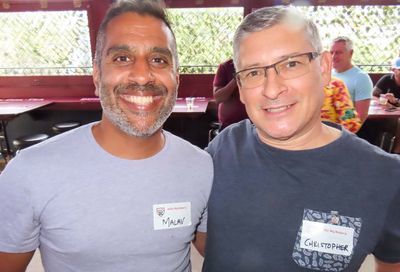Stonewall Bocce Fights to Remain on Logan Circle
Stonewall Bocce is an LGBTQ social and economic boon to Logan Circle. So why is the National Park Service trying to oust them?
By John Riley on February 7, 2023 @JRileyMW

Since 2011, twice a year, in the spring and fall, Stonewall Bocce, the District’s only LGBTQ bocce league, has met at Logan Circle on Thursday evenings for about 12 weeks.
During the season, hundreds of people pack the circle each week as they watch their friends, neighbors, or teammates toss or roll brightly-colored two-pound balls along the grass, hoping to get their balls as close as possible –- or at least closer than their opponents’ balls –- to a small white target ball, known as the pallino.
The rules are simple: a team has four balls, and scores points for each ball that gets closer to the pallino than their opponents’ closest ball. Balls are recycled after each round, and games continue until one of the teams reaches 15 points.
On any given Thursday, 26 different games are being played simultaneously as 52 teams hope their skill and finesse will earn them victory. Spectators and teammates alike cheer on the competitors, silent while they’re tossing the bocce balls, but effusive when celebrating a good round.
Though spacious, Logan Circle is not the ideal type of field one would like to play bocce on, says Justin Zanetti, one of eight Stonewall Bocce Commissioners.
“Logan Circle, although it’s very pretty, the ground is not very even,” he says. “So the circle throws a bit of a curveball into how you toss the ball, because the ground is uneven, and sometimes you’re dealing with twigs, leaves, divots in the ground, mounds of dirt here or there. It’s kind of like a bit of an obstacle course, but it still makes for a good time.”
A recent edict issued by the National Park Service has threatened to block all future bocce games from Logan Circle, putting an end to the jovial atmosphere of camaraderie and friendly competition.
Although Stonewall has been playing on Logan Circle for more than 11 years, the league appears to have been issued permits to play there in error. Under National Park Service regulations, playing organized sports on park lands is prohibited, “except pursuant to a permit and upon the grounds [designated] for such purposes.”
That means organized leagues playing on NPS property must only use East and West Potomac Parks, near the Tidal Basin, just south of the National Mall, and not Logan Circle, which is not a designated athletic field.
Recognizing their error, NPS moved last fall to halt all organized bocce games, notifying league organizers only five days before their season was slated to begin. After outcry from the community, the NPS backed off and issued a temporary reprieve, granting the league the permits to play on Logan Circle for one additional season, but demanding that games be held elsewhere in the future.
“What we’ve been told, is that [according to NPS regulations] no league sports can be played in Logan Circle,” Stonewall Bocce co-commissioner Vernon Wall tells Metro Weekly. “Our response has been that we’re not really a ‘sport’ in terms of the impact on the fields. It’s not like soccer or football.
“What we believe happened is there was a lot of turnover during the pandemic, and someone was in the office. The request for a permit came across their desk and they saw a ‘sport’ and said no. And when we followed up to say, ‘Hold on, why did you say no?’ And they said, ‘Well, no league sports on Logan Circle.’ And then our response was, ‘Well, you approved this for 11 years.’ And their response back was, ‘We don’t care. No league sports on Logan Circle.’”
After WUSA9 got in touch with the NPS, says Wall, “they changed their minds and said, ‘Okay, we’ll give you one more permit just for the fall, since you’ve already taken everybody’s money, but you’ve got to find a new place for the spring.”
But Wall says moving the league down to the Tidal Basin area is impractical.
“The majority of our players are located around Logan Circle. It’s not a sport like kickball where there are several games at different times of the day. We hold all our matches for an hour on a Thursday evening. And to make everyone trek down to the Tidal Basin for an hour is generally not feasible,” he says.
Wall adds that what should also be taken into account is Stonewall Bocce’s tradition of giving back to the community and supporting local establishments. Each season, a team picks a charity — or has a default league charity assigned to them — that they help raise money for through their games.
Moreover, the league’s 800-plus players give a significant amount of business to local restaurants and bars before or after games.
As a testament to the potential spending power of the LGBTQ community that local businesses could choose to harness, Zanetti, the co-commissioner, notes that bocce has grown so popular in recent years that organizers have had to expand the number of teams in the league — and even then, there’s a waitlist of individuals eager to join that the league just can’t accommodate.
“We’re kind of hitting that point where soon the circle isn’t going to be large enough to accommodate many more people,” he says.
Players say it’s common to make game nights a full-on social outing.
Ben Auman, a 40-year-old Brookland resident who plays for the team Bocce Don’t Preach, says his team makes group outings to the league’s sponsor bars, such as Trade, Number Nine and Green Lantern, a regular occurrence.
“Beforehand, some of the people on my team meet at a bar and have some drinks, then we play our game. But afterwards, everyone goes to eat out as a group. We like to go to Shake Shack and then hang out at the bars, and it just makes a boring weeknight something fun and interesting that gives you time to catch up with friends.”
Wall believes that supporting local businesses is an essential part of Stonewall Bocce’s ethos, and notes that the league already has plans to hold four “happy hours,” at Trade, Number Nine, Green Lantern, and Dacha Beer Garden throughout the season, in the hopes that members will patronize those local nightlife spots.

“We’re excited about spreading the wealth to all of the bars and restaurants in the area,” Wall says. “I wish we had some solid numbers to show how much money we’re pumping into the area, because Stoney’s and Logan Tavern are regularly slammed with plates. Even Chipotle is.”
Wall says that holding matches at West Potomac Park, south of the Lincoln Memorial, or at the far-flung East Potomac Park, which is on a peninsula to the south of the Jefferson Memorial, would leave league participants far from any LGBTQ establishments. The distance would likely lead players to disperse and head home instead of going out to bars or restaurants as teams.
Wall also doesn’t believe the quality of the long-grass fields at East or West Potomac Park are good terrain for bocce matches — short of finding a turf field in the area, Potomac Park may actually be worse than the short-grass, albeit sometimes rough, terrain of Logan Circle.
Another issue concerning Wall is the belief that Stonewall Bocce’s ranks could take a significant hit if the fields are moved significantly away from the Logan neighborhood.
“Last season, we had 840 people register for bocce,” says Wall. “I believe that at least half the league would not choose to go down to the Tidal Basin.”
To convince NPS to allow them to stay, Stonewall Bocce has asked its members and allies to sign an online petition at MoveOn requesting that the league be allowed to continue playing in Logan Circle. The petition has gained 425 signatures so far.
The league received two letters of support, one from the business advocacy group Logan Circle Main Street, which has praised the league for helping to revive a nightlife and restaurant industry decimated by the COVID-19 pandemic.
The other letter came from Advisory Neighborhood Commission 2F, whose commissioners represent Logan Circle when it comes to zoning and other regulatory decisions. Several of the league’s sponsor bars have written to the NPS asking them to allow Stonewall Bocce to continue to use the circle for games.
“We probably leave the circle cleaner than we found it, because everybody picks up after each other,” Wall says. “And as far as Logan Circle Main Street is concerned, I think they like to see activity on the circle. Logan is not like Dupont where people hang out and eat lunch and that sort of thing. It’s typically a circle that folks don’t really go to, except maybe on the weekend where someone may sit under a tree, but it’s not a destination. And we allow folks to see that there can be activity there.”

League organizers reached out to the office of Del. Eleanor Holmes Norton, the District’s non-voting representative in Congress, as well as to the mayor’s office and various D.C. councilmembers in the hopes that they would convince NPS to allow Stonewall Bocce to remain at Logan Circle. Another alternative would be to allow the league to relocate to land owned by the District of Columbia, which would fall under the purview of the D.C. Department of Parks and Recreation.
But organizers say they didn’t hear back from any government officials, with the exception of Ward 2 Councilmember Brooke Pinto, whose office sought to lobby the NPS with the idea that Stonewall Bocce might be issued a permit as a “community event” rather than as an athletic league.
“A lot of people talk about supporting Stonewall Bocce, but no one’s really taking action,” Wall says, noting that several D.C. councilmembers were up for re-election last fall and took advantage of photo opportunities with Stonewall players, yet it was Pinto — who is not running for re-election, and is not an At-Large member — who took action.
A spokesperson for the National Park Service told Metro Weekly on Wednesday that Stonewall Bocce’s application was still being processed.
“We have received an application from Stonewall Bocce for their spring 2023 season and continue to work with the interested parties, including Councilmember Pinto’s office, to find a mutually agreeable solution,” the spokesperson said in a statement.
Pinto’s office expressed hope for negotiating a compromise between the league and the NPS.
“Stonewall Bocce is an incredible, inclusive organization that brings neighbors together and fosters community,” Pinto said in a statement. “I strongly believe that the league should be allowed to continue playing in the Logan Circle neighborhood, one of the most prominent historically LGBTQQIA+ neighborhoods in the country. I have had and continue to have conversations with both the league and NPS to determine how we can ensure the continued, safe use of Logan Circle and am optimistic that a resolution will be arrived at soon.”
Regarding a possible move from NPS land to District-owned property, organizers say they initially reached out in December and were informed that the permitting process began in January, and that youth sports would take precedence over any other permitted activities. As soon as the permitting process opened on Jan. 3, organizers reached out to the Department of Parks and Recreation, only to be told that the parks were already reserved for other events.

The Department of Parks and Recreation, whose director is appointed by the mayor, issued a statement: “The Department of Parks and Recreation is happy to work with any sports organization to permit space in our fields and facilities. Permitting is done on a seasonal basis and information can be found online at https://dpr.dc.gov/permits.”
A DPR source told Metro Weekly that the fields Stonewall Bocce requested were unavailable and already permitted. According to that source, DPR has not received any new correspondence or permit applications from Stonewall Bocce.
With their options through DPR closed off, organizers turned back to the NPS, and applied for a permit, just as they have historically done.
“We were just placed in a holding pattern,” Wall says. “We completed the application, and sent another message to the National Park Service to say we hadn’t heard anything back.”
Organizers didn’t have much time to stew in uncertainty or wait for a slow-moving bureaucracy, as the first game of the season is scheduled for March 16. That means organizers have about a month to gauge the level of interest in playing, figure out the number of teams that will be competing, and order T-shirts for hundreds of players. They set registration for Feb. 6 and 7, with 825 players registering by noon on Tuesday.
“We didn’t want to take everybody’s money if we were not going to be able to play. We didn’t want to be surprised five days before our first game, like we were last season,” says Wall. “But since we didn’t hear back definitively from the Park Service about our application, we moved forward as if we’re going to play on Logan Circle this spring.”
Unfortunately, the NPS again denied Stonewall Bocce’s request for a permit, saying the previous permits had been issued in error but offering to “work with [Stonewall Bocce] to find other locations where league play could occur and be permitted.”
But the NPS also noted, in an email sent to organizers obtained by Metro Weekly, that “[w]hile league bocce play requires [an] NPS permit as a formal sports activity, casual bocce play and other casual uses of NPS areas do not require permits. Such activities may include purely recreational sports activities in areas not set aside for organized sports event (sic) or activities, including casual bocce games.”
According to the guidelines for casual play, it appears that Stonewall cannot have a set schedule, official registration or sponsorships, or impose fees that mimic an organized sport. Unpermitted use of the park is allowed on a first-come, first-served basis, meaning Stonewall Bocce must play around any other recreational activities occurring on the circle, and cannot “reserve” sections of the circle for their games or post signage on the ground or trees directing people to areas where matches are being held.
Additionally, according to NPS regulations, unpermitted activities on NPS land “should not have the intent or propensity to attract a crowd or onlookers,” and any sponsored activities, publicity, or promotional activities on behalf of official leagues are prohibited. That raises questions about why NPS hasn’t cracked down on other sports leagues playing on NPS lands that aren’t East or West Potomac Park.
“I think this is their version of a compromise,” says Wall. He notes that Stonewall will not be imposing a registration fee this season but will accept voluntary donations from players.
It remains unclear whether teams will be allowed to wear league shirts or whether that would be considered “promotional.”
Regardless of the restrictions placed on the league, organizers and players alike say the benefits of bocce outweigh the obstacles that bureaucrats have placed in their path.
“I think it’s important for people to know that the majority of people who play bocce don’t play any other Stonewall sport,” says Wall. “We’ve had people tell us, whether they’re new to D.C. or have been around for a while, that it’s not as intimidating as other league sports. It’s a low-skill event, which means you don’t have to be athletically gifted to excel or to enjoy it. That takes a lot of the pressure off.”
Many of the players say that another benefit of bocce is that while it’s still a competition, it’s not intensely competitive to the point of scaring people off.
“I tell people the appeal of bocce is that it is a very laid back sport,” says co-commissioner Daniel Spelt. “There’s not a lot of competitive pressure, and it’s also a lot of fun. I think it’s a great way to meet people in that kind of no pressure, non-committed environment. You show up, you hang out, play a bocce game, and that’s kind of it. Everybody makes the playoffs.”
“Stonewall Bocce builds community, period,” adds Wall. “It’s an opportunity for folks to meet new people and socialize, to find a sense of belonging.”
“Bocce is definitely not known for its cliques,” says co-commissioner Howard Shores. “Having played kickball, darts, cornhole, almost all the Stonewall Sports, the game itself — I don’t know whether it’s the setting or the fact that it’s easygoing — people are very friendly. They get to know each other pretty well. We have quite a few teams that might take it upon themselves to do their own mixers and we often head out to our sponsor bars afterward. The teams mix very well.”
J.R., a 35-year-old Dupont resident, says he was introduced to Stonewall Bocce through an ex-lover.
“We’ve since parted easy,” he says. “But I fell in love with the game of bocce. And then I stole all his friends. And now we’re on a team together.
“This is the only gay sports league I’ve ever actually participated in,” he continues. “And I suppose the appeal, for me, is that it doesn’t require much practice. The rules are easy to learn. It’s easy to do right after work on a Thursday. It feels very casual and relaxing, almost like a happy hour being held outside.”
Stonewall Bocce plays every Thursday evening starting March 16. For more information, visit stonewallbocce.leagueapps.com.
Americans Find Changing Gender Morally Wrong, Says Gallup Poll
A thin majority finds transitioning morally wrong, while a larger majority opposes bans on gender-affirming care for minors.
By Will O'Bryan on July 1, 2024
According to polling data recently released by Gallup, a razor-thin majority of Americans continue to believe changing one’s gender is morally wrong.
The same data, from Gallup’s annual Values and Beliefs poll, conducted in May, show a substantial majority of Americans are opposed to bans on gender-affirming care for minors.
While this polling is relatively in line with data from since 2021, the independent Trans Legislation Tracker shows a clear increase in anti-Trans legislation starting in 2020, with 85 bills, versus 32 in 2019 and 155 in 2021.
For 2024, the Tracker tallies 617 bills.
Robert Davis Gets 15 to 30 Years for Murder of Josh Kruger
Kruger, a gay journalist and recovering addict, was shot by Davis seven times at his home in South Philadelphia last October.
By John Riley on June 19, 2024 @JRileyMW
Robert Davis pleaded guilty earlier this week to the murder of gay journalist Josh Kruger. He has been sentenced to 15 to 30 years in prison.
Prosecutors claim Davis entered the 39-year-old Kruger's home in Philadelphia's Point Breeze neighborhood last October and shot him seven times before fleeing.
Kruger managed to call for help before stumbling outside his house and collapsing on the sidewalk. He was taken by police to the hospital, where he was pronounced dead on arrival.
Earlier this year, Davis waived his right to a preliminary hearing and indicated that he intended to plead guilty to charges related to Kruger's death, as well as to charges of aggravated assault and illegal gun possession for an unrelated incident in which he fired a gun at someone at a SEPTA train platform last September. No one was injured in that incident.
A West Virginia Bakery Lets Haters Eat Their Words
Charleston’s Rock City Cake Co. puts bitter Pride attacks on sweet butter cookies to deliciously combat homophobia.
By Will O'Bryan on June 12, 2024
In this June Pride season, brimming with rainbows, glitter, and goodwill, the June 1 Facebook post from the Charleston, W.V., Rock City Cake Co. doesn’t seem at all out of place.
“Happy Pride Month everyone!” the post begins, accompanied by a rainbow retooling of the bakery’s logo. It’s a relatively benign post, though just a bit more affirming than anything the bakery had posted in past Pride seasons.
“We want to extend our hand to EVERYONE to always feel comfortable, safe, and welcome in our establishment. I’ve always said a slice of cake brings everyone to a seat at the table together, whether we agree on things or not.”
Support Metro Weekly’s Journalism
These are challenging times for news organizations. And yet it’s crucial we stay active and provide vital resources and information to both our local readers and the world. So won’t you please take a moment and consider supporting Metro Weekly with a membership? For as little as $5 a month, you can help ensure Metro Weekly magazine and MetroWeekly.com remain free, viable resources as we provide the best, most diverse, culturally-resonant LGBTQ coverage in both the D.C. region and around the world. Memberships come with exclusive perks and discounts, your own personal digital delivery of each week’s magazine (and an archive), access to our Member's Lounge when it launches this fall, and exclusive members-only items like Metro Weekly Membership Mugs and Tote Bags! Check out all our membership levels here and please join us today!
The Magazine
-
Most Popular
 Matt Walsh Blasts Amber Rose's Appearance at the RNC
Matt Walsh Blasts Amber Rose's Appearance at the RNC  Kamala Harris to Appear on "RuPaul's Drag Race All Stars" Finale
Kamala Harris to Appear on "RuPaul's Drag Race All Stars" Finale  Poll: Who Should Kamala Harris Pick as Vice President?
Poll: Who Should Kamala Harris Pick as Vice President?  J.D. Vance Blocked 30 Pro-LGBTQ Ambassadors
J.D. Vance Blocked 30 Pro-LGBTQ Ambassadors  Buttigieg Smacks Down Vance for "Childless Left" Comment
Buttigieg Smacks Down Vance for "Childless Left" Comment  Pete Buttigieg's Blistering Takedown of J.D. Vance
Pete Buttigieg's Blistering Takedown of J.D. Vance  Gay Porn Star Austin Wolf Arrested on Child Pornography Charges
Gay Porn Star Austin Wolf Arrested on Child Pornography Charges  Gay Porn Star Forced by Russian Police to Entrap Gay Men
Gay Porn Star Forced by Russian Police to Entrap Gay Men  Losing Its Mind Over Kamala Harris, MAGA Stoops to Ugly Name-Calling
Losing Its Mind Over Kamala Harris, MAGA Stoops to Ugly Name-Calling  Elon Musk Says "Woke Mind Virus" "Killed" His Trans Child
Elon Musk Says "Woke Mind Virus" "Killed" His Trans Child
 Poll: Who Should Kamala Harris Pick as Vice President?
Poll: Who Should Kamala Harris Pick as Vice President?  Kamala Harris to Appear on "RuPaul's Drag Race All Stars" Finale
Kamala Harris to Appear on "RuPaul's Drag Race All Stars" Finale  This Week's Advertisers: Issue of July 25, 2024
This Week's Advertisers: Issue of July 25, 2024  J.D. Vance Blocked 30 Pro-LGBTQ Ambassadors
J.D. Vance Blocked 30 Pro-LGBTQ Ambassadors  Buttigieg Smacks Down Vance for "Childless Left" Comment
Buttigieg Smacks Down Vance for "Childless Left" Comment  Elon Musk Says "Woke Mind Virus" "Killed" His Trans Child
Elon Musk Says "Woke Mind Virus" "Killed" His Trans Child  San Francisco's Legendary Gay Club Oasis Robbed at Gunpoint
San Francisco's Legendary Gay Club Oasis Robbed at Gunpoint  D.C. High School Ordered to Recognize Anti-Gay Group
D.C. High School Ordered to Recognize Anti-Gay Group  Vineyard Voyages: Driving Through Virginia's Wine Country
Vineyard Voyages: Driving Through Virginia's Wine Country  Losing Its Mind Over Kamala Harris, MAGA Stoops to Ugly Name-Calling
Losing Its Mind Over Kamala Harris, MAGA Stoops to Ugly Name-Calling
Scene
Metro Weekly
Washington's LGBTQ Magazine
P.O. Box 11559
Washington, DC 20008 (202) 638-6830
About Us pageFollow Us:
· Facebook
· Twitter
· Flipboard
· YouTube
· Instagram
· RSS News | RSS SceneArchives
Copyright ©2024 Jansi LLC.













You must be logged in to post a comment.